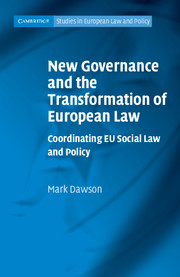Book contents
- Frontmatter
- Contents
- Series editors’ preface
- Acknowledgments
- Table of cases
- Table of treaties
- Table of legislation
- Table of Council Decisions
- Introduction
- 1 The origins of an Open Method of Coordination
- 2 Relating governance and law
- 3 Governance as proceduralisation
- 4 Assessing the procedural paradigm
- 5 Constitutionalising new governance
- Epilogue The future of the Open Method of Coordination
- Annex 1 Questions for the respondents
- Annex 2 List of non-governmental respondents
- Annex 3 History and development of the OMC SPSI (1997–2010)
- Annex 4 The new ‘streamlined’ OMC SPSI (2008–10)
- Bibliography
- Index
- References
Introduction
Published online by Cambridge University Press: 05 November 2011
- Frontmatter
- Contents
- Series editors’ preface
- Acknowledgments
- Table of cases
- Table of treaties
- Table of legislation
- Table of Council Decisions
- Introduction
- 1 The origins of an Open Method of Coordination
- 2 Relating governance and law
- 3 Governance as proceduralisation
- 4 Assessing the procedural paradigm
- 5 Constitutionalising new governance
- Epilogue The future of the Open Method of Coordination
- Annex 1 Questions for the respondents
- Annex 2 List of non-governmental respondents
- Annex 3 History and development of the OMC SPSI (1997–2010)
- Annex 4 The new ‘streamlined’ OMC SPSI (2008–10)
- Bibliography
- Index
- References
Summary
The rise – and relevance – of new governance in the European Union
In signalling the development of the Open Method of Coordination (OMC) through the Lisbon European Council in 2000, EU leaders were primarily interested in a particular goal – to make the EU, by 2000, the most dynamic economic area in the world. Their actions, however, also triggered a deep and lasting debate regarding the development of ‘new’ or ‘alternative’ modes of governance in the EU: a debate that has found its most recent instalment in the scramble to build a new Lisbon strategy for the decade leading to 2020. The very use of the term ‘new governance’ to describe methods like the OMC already creates the capacity to confuse. What is ‘governance’ anyway and what is ‘new’ about it? What methods of EU law and policy are included under the ‘new governance’ label and which are outside of it? What are the criteria against which new governance methods should be evaluated? These questions will be asked and answered in the first and second chapters of this book.
A more foundational question, however, must also be addressed. Why is the new governance debate a debate fundamentally worth engaging in? What is it about the turn to governance in the EU that makes analyses of these methods important, both for lawyers, and for the broader category of all those interested in EU integration? At one level we should approach this question with a healthy scepticism. As indicated by the Lisbon Council, one of the essential features of methods like the OMC is that they are non-binding. Given that new governance methods do not in most – but by no means all – cases lead to ‘proper law’, why should we then take their procedures and outcomes seriously? (Or, indeed, read a whole book about them!)
- Type
- Chapter
- Information
- New Governance and the Transformation of European LawCoordinating EU Social Law and Policy, pp. 1 - 23Publisher: Cambridge University PressPrint publication year: 2011



